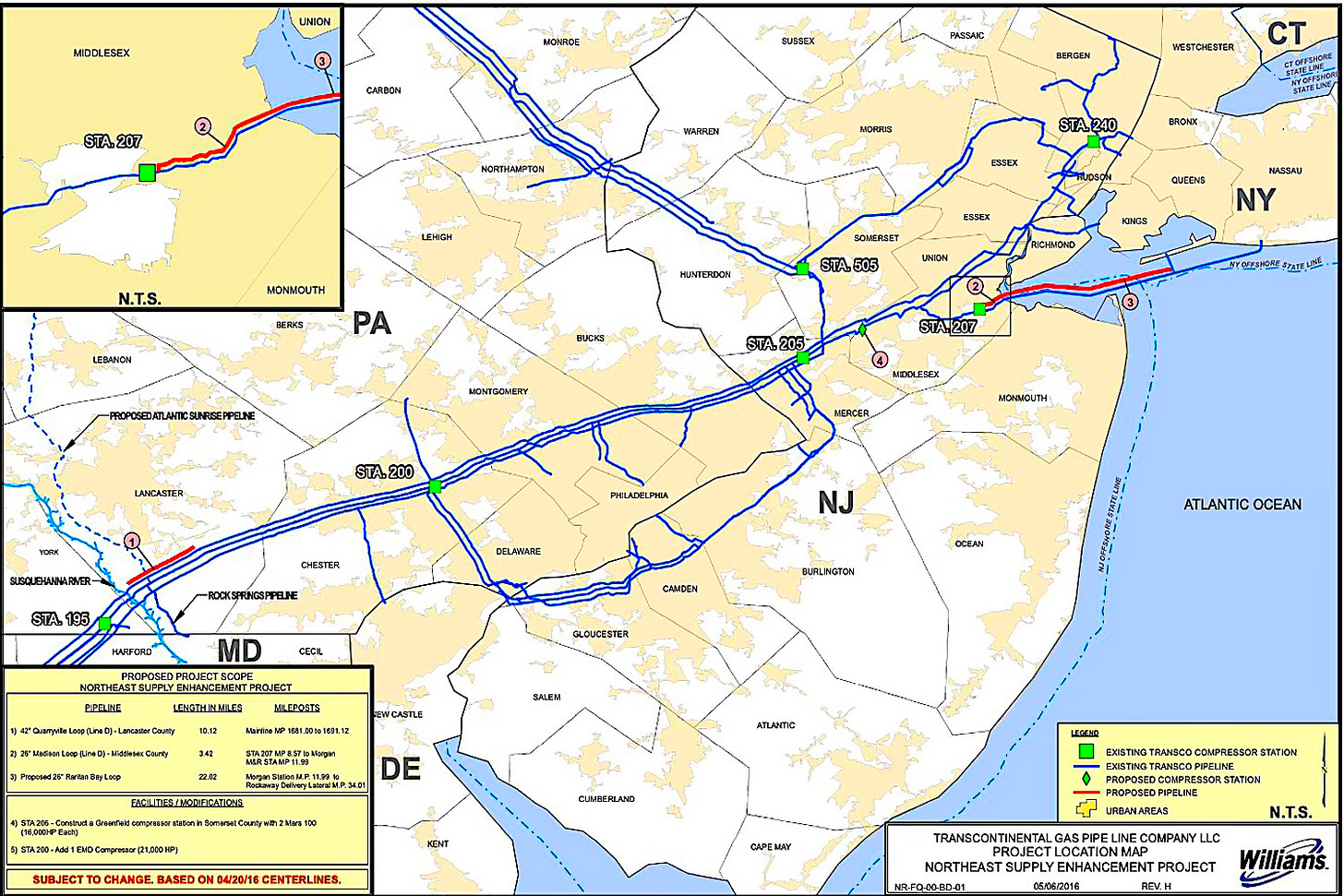The Walls Are Closing on Hochul, Forcing Her to Choose Between Net Zero Fantasies and Energy Reality. Guess Who's Winning?
Guest post by Jim Willis of Marcellus Drilling News.
President Trump’s version of his conversations with New York Governor Kathy Hochul was correct: She caved. Yesterday, pipeline giant Williams filed a request with the Federal Energy Regulatory Commission (FERC) to expedite the reissuance of a certificate for the Northeast Supply Enhancement (NESE) project, a billion-dollar-plus project designed to increase Transco pipeline capacity and flows of Marcellus gas heading into New York City and other northeastern markets.
NESE is one of two projects, along with the Constitution Pipeline, on which Hochul “caved” in a deal with Trump (see White House Claims NY Gov. “Caved” on Pipelines, Hochul Says No). He gave her the right to continue blowing $5 billion on a horrible offshore wind project. In return, Trump secured an agreement to allow two Williams pipeline projects, including NESE.
NESE has several components, but the key element, the heart of the project, is a new 23-mile pipeline from the shore of New Jersey into (on the bottom of) the Raritan Bay, running parallel to the existing Transco pipeline before connecting to the Transco pipeline offshore. Most of the pipeline would be located underwater. Here’s a map of the project:
Just yesterday, MDN told you that, based on reports from the Wall Street Journal and Bloomberg, Williams was “imminently” going to file with FERC to revive both NESE and the Constitution Pipeline projects (see Williams to “Imminently” File with FERC to Revive 2 New York Pipes). We even said it could happen yesterday. And it did! At least, for NESE, it did. Williams has not asked FERC to revive the Constitution project. Yet. We expect that one to be filed soon.
We were alerted to Williams’ FERC filing in an article appearing in (gasp) the New York Times:
A pipeline company is reviving plans to build two natural gas pipelines into New York State, a major reversal that amounts to a bet that the Trump administration will be able to strong-arm states into signing off on energy projects.
New York had blocked both pipelines, called Constitution and Northeast Supply Enhancement, over environmental concerns. But the Trump administration has made clear that it wants more oil and gas infrastructure, including in the Northeast, where pipelines had become so hard to build that companies had all but given up on them.
The decision by the pipeline business, Williams Companies, to formally restart efforts to build the pipelines comes a week after the Trump administration withdrew its opposition to a wind energy project, Empire Wind, off the coast of Long Island, after weeks of lobbying by Gov. Kathy Hochul of New York.
As part of the discussions over letting Empire Wind move forward, Ms. Hochul said she would work with the Trump administration on new energy projects, though she did not explicitly mention pipelines. But Doug Burgum, the interior secretary, later posted on X that Ms. Hochul had signaled a “willingness to move forward on critical pipeline capacity.”
The Constitution pipeline was designed to transport gas more than 100 miles from northeast Pennsylvania toward Albany. The lesser-known and shorter Northeast Supply Enhancement project would run largely underwater, from New Jersey toward New York City.
Williams, based in Tulsa, Okla., said Thursday that it was in talks with state officials about the projects. It also filed paperwork with the Federal Energy Regulatory Commission, asking the agency to reinstate a permit for the Northeast Supply Enhancement. Williams said it aimed to start using the pipeline by late 2027.
The company scrapped both projects after New York officials in effect blocked them by denying water quality permits. In a statement, it described the projects as “essential to address persistent natural gas supply constraints in the Northeast, constraints that have led to higher energy costs for consumers and increased reliance on higher-emission fuels like fuel oil.”
Ms. Hochul said on Thursday that the pipelines could help lower energy costs but added that they would have to abide by state and local laws. “Consider the benefits at a time when energy prices are through the roof and families in every corner of our state are suffering high bills for groceries and utilities,” she said, adding that she would remain committed to New York’s climate goals.
The battle over gas pipelines from Pennsylvania — which is home to a portion of a prolific natural gas field called the Marcellus — into New York and New England has been raging for years.
As New York and New England have closed their coal-fired power plants over the past two decades, they have come to rely heavily on natural gas, which now supplies nearly half of all electricity in both regions. Yet natural gas and electricity costs in the Northeast are among the highest in the country, partly because there aren’t enough pipelines to deliver fuel to the region.
The gas industry and some experts have argued that piping in more cheap gas from Pennsylvania’s abundant shale fields would reduce the cost of energy in New York and New England.
“When you get into the Northeast, the states’ ability to block pipelines has been pretty chronic, particularly in the New York City market,” Alan Armstrong, chief executive of Williams, said in an interview with Bloomberg in March. “I think what’s going to fix that is people being really upset about their utility bills.”
A recent study by S&P Global found that expanding pipelines could reduce natural gas prices in the Northeast by 20 to 30 percent. The effect would be greatest during winter months, when demand is high because gas is used for heating.
Yet many Democratic officials and environmentalists have strongly opposed new pipelines on the grounds that the additional natural gas would make it harder to tackle global warming.
Some analysts have argued that the climate impacts of new gas pipelines are complex. In the short term, the extra natural gas might help reduce New England’s emissions, by displacing oil or liquefied natural gas that generate more emissions per unit of energy. Over a longer period, however, a large supply of cheap gas could discourage businesses and residents from switching to renewable energy or electrifying their homes.
In 2016 and 2020, Andrew Cuomo, New York’s governor at the time, blocked Williams’s attempts to build pipelines into the state by denying it water permits under the Clean Water Act, on the grounds that the projects could pollute local waterways and increase greenhouse gas emissions. New Jersey also denied a water permit for the Northeast Supply Enhancement pipeline.
For Ms. Hochul, new projects that help lower energy costs could be critical politically. She is up for re-election next year and several rivals are exploring runs against her. Her approval numbers have been middling partly because voters are upset about the high cost of living.
She focused much of her efforts during recent budget negotiations on tax breaks and direct refund checks to residents. She has also criticized proposed rate hikes from Consolidated Edison and the New York Power Authority.
Assemblywoman Anna Kelles, a Democrat from Ithaca, said on Thursday that allowing the two pipelines was not the right way to reduce energy costs. She said the state should cap utility bills and encourage more energy-efficient ways to heat homes. Ms. Hochul and her aides should also hasten a program that would limit greenhouse gas emissions while raising money for climate projects, Ms. Kelles said.
“It’s kind of disingenuous to criticize the status quo if we’re not investing in alternatives,” Ms. Kelles said of Ms. Hochul.
Even if Williams faces fewer regulatory barriers, the pipelines still face other potential hurdles. The company needs to line up enough long-term customers for its gas to secure financing for the projects, which had previously been estimated to cost nearly $1 billion each.
Natural gas demand is likely to remain elevated for years, especially since New York and other Northeastern states are struggling to build offshore wind projects. But those states have also set aggressive goals for reducing fossil fuel use, and it’s unclear whether enough businesses will want to sign 20-year contracts to buy piped gas.
“Financing these pipelines is expensive, and the big question is always, Is the gas demand really there?,” said Christine Tezak, a senior director at ClearView Energy Partners, a research firm. “Even if we’re in a very different environment than we were five years ago, I wouldn’t call it a slam dunk just yet.”
Local residents and environmental groups could also try to block the pipelines. Mark Izeman, a senior strategist at the Natural Resources Defense Council, said the projects “will once again be met with stiff and deep resistance in the region — and would inevitably end up in protracted legal battles.”
Hochul and Williams also communicated with Spectrum News’ NY 1 reporters:
The Trump administration is trying to expand natural gas supply flow throughout the Northeast using interstate pipelines — a goal that’s been stymied in the past by fierce local opposition and Democratic state and local governments.
But on Thursday, with hopes of getting federal support from the Trump White House, an energy company announced it wants a second shot at building natural gas pipelines spanning hundreds of miles across the Empire State.
The goal? Delivering reliable energy to the Northeast.
President Donald Trump discussed pipeline projects with Gov. Kathy Hochul recently, according to sources familiar with the conversations.
NY1 asked Gov. Kathy Hochul where she stood on Thursday.
“My message is what I told the President, which is that I will make sure that any applicant for a pipeline or any energy project follows all state, local and federal laws,” she said during a groundbreaking for a new Port Authority Bus Terminal in Midtown.
“That being said, we can look at this expansively and also consider the benefits at a time when energy prices are through the roof and families in every corner of our state are suffering from high bills for groceries and utilities,” she continued.
Hochul’s openness appears to have encouraged the Oklahoma-based energy company, Williams. Officials for Williams told NY1 they filed a petition with the Federal Energy Regulatory Commission to revive its Northeast Supply Enhancement Project that would run beneath New York harbor to New Jersey.
Williams is also in talks to construct the Constitution Pipeline, connecting upstate New York to Pennsylvania.
“The NESE and Constitution projects are essential to address persistent natural gas supply constraints in the Northeast, constraints that have led to higher energy costs for consumers and increased reliance on higher-emission fuels like fuel oil,” a spokesperson for Williams told NY1.
“I have to look at this in a different lens and will continue being committed to our climate goals. I believe in them, but also the realization that we need to be more open-minded and expansive, but they will have to follow our laws and they know that. I was very clear on this,” Hochul said.
Environmental advocates say Hochul should deny the new requests.
“These two ill-considered pipelines are exhibit A in what we should not be doing if we want clean water and healthy communities in New York,” Mark Izeman, a senior strategist at the Natural Resources Defense Council, said.
That’s what happened to the same two projects in the past — especially as former governor turned mayoral candidate Andrew Cuomo ranked among the chief opponents.
“Last time around, both of these pipelines met stiff and deep opposition, and that will happen once again. And both New York and New Jersey rejected these pipelines over threats to water quality,” Izeman said.
New York’s Department of Environmental Conservation also refused to file necessary water permits, and in 2020, the state’s strict climate law was invoked to kill the Northeast Supply Enhancement Project.
But this time could be different, according to Gary LaBarbera, president of the Building and Construction Trades Council.
“I think all things should be considered, and you know when you’re talking about gas pipelines, that’s more good union jobs. But I think you have to have an all of the above approach,” LaBarbera said.
Construction, however, could still be months away.
Should the projects gain federal approval, National Grid would need to change its long-term energy plan, after which the Department of Public Service would conduct a review of the application.
Here is the 246-page request Williams filed with FERC, asking the agency to reissue a certificate for the NESE project ASAP.
Editor’s Note: The pressure on Hochul from the Rockefellers (NRDC, Catskill Mountainkeeper, et al) and the Park Foundation (Food & Water Watch, etc.) will be enormous, but circumstances have changed since they convinced Cuomo to ban fracking and all that.
And, it’s not just that Trump is leaning in on the problem. It’s now clear to those in the know that the fantastical dreams behind New York’s Climate Act are never going to be realized. The Empire State can’t even pretend to be one any longer without more real energy to fund data centers and the like. Reality has put Hochul in a vice, and the only to escape is to bring it in using the stupid Empire Wind project as a fig leaf.
It all brings to mind the uniquely New York history of one man, Robert Moses. He wielded unimaginable power over the city and state for decades, repeatedly threatening to resign from this and that commission unless he got his way. That is, until one governor by the name of Nelson Rockefeller simply accepted his resignation, ending the reign of a behind-the-scenes tyrant.
Now, it may well be the Rockefellers’ turn. Kathy Hochul has effectively told them they don’t matter as much as they once did, and, win or lose, that’s a very good thing, because it’s the truth. They can bellow. They can throw money at politicians and true believers. They can finance lawfare. But, they cannot change the fact New York needs what they cannot deliver.
#NewYork #ClimateAct #Lawfare #Hochul #Cuomo #NaturalGas #Pipelines #Williams #NESE #ConstitutionPipeline
For more great articles on natural gas development every single day, subscribe to Marcellus Drilling News using this convenient link.






The rationale for denying the original pipeline permits was that they would cause water quality issues at stream crossings and in New York harbor. That problem was overlooked when the Champlain Hudson Power Express underground transmission line was permitted and when the power lines from offshore wind was routed into NYC. About time for some reality
Pipelines are expensive - and giant boondoggle windmills aren't? At least the pipelines have a positive outcome for the people Hochul is supposed to be serving. Can't say that for the windmills. And as long as anyone with any sense at all sits in Washington the whales will have some reprieve from the devastating activities of the surveyors.